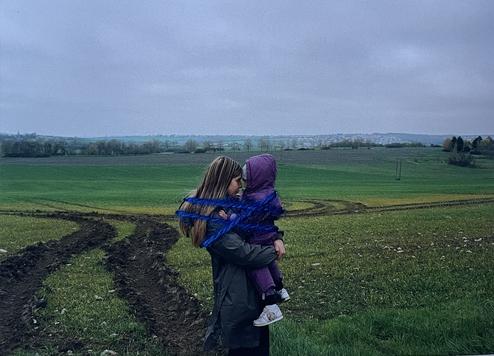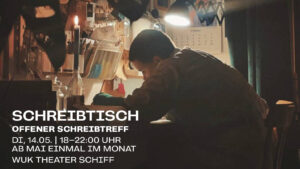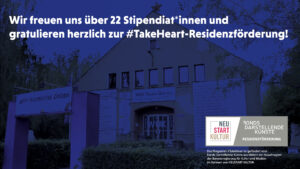Galyna Denysiuk, eine unserer vier #DACH-Stipendiatin 2022, spricht im Interview mit Mereth Garbe für unsere Zeitung für unser Kapitel #gesundsein über das Heilsame des Kunst-Machens. Sie wird ihre Arbeiten bei LASSO am 12.+13.05. präsentieren.
„I used to hear questions like »You are from Ukraine – so are a tourist here?«“
How are you?
I am fine. I just moved in a my first appartment. Not easy in Berlin.
It’s sometimes hard to divide between an honest question and another word for „Hello“ to start a conversation. May I ask a second time?
Yes, that’s another conversation. Physically I am healthy. For the main existing I am ok. But like all Ukrainians since 24.2.2022 I am telling that I am ok. I don’t want to put my emotional luggage on someone. Underneath there is always anxiety. As constant background. You can tell your true emotions just to people you trust. It’s not easy. And sometimes people are not ready for the answers. They are asking and you can see that they are afraid to listen. In Ukraine here is war since 2014. If people tell that they are from the region Donetsk, from russian occupied territories, other ukrainian people stopped asking, don’t know how to react. Some are offended by this, some understand. If I see, that people are not interested or afraid of answers I don’t tell them.
I can relate to that. In the mediaval story „Parzival“ there is a cursed and ill king, who is finally healed and freed by the question „What are you suffering from?“. What would you answer?

I miss a lot of things. First of all I miss to feel save or home, to feel in a place I belong to. Berlin is nice, I have friends here. But not that close. And in the new appartment I also don’t feel home. I don’t know how to describe this. I used to hear questions like „You are from Ukraine – so are a tourist here?“ I couldn’t image people to say something like this. I would ask people in general to show more empathy in daily live. Let refugees know that they are not alone. Don‘t hide your eyes, show that you feel sorry for what had happend, or is still happening. Sometimes that‘s a breaking point. Don’t be shy. Refugees need mental health support.
Would you call art a place to heal?
Personally art is calming me down. I am very concentrated. It gives me power to exist. I see a lot of people that are carrying this „guilt“ of being away from their home. I want to help them and show them with my art that they are not alone. Emotionally the research has ups and downs. Especially when you are being rejected. Sometimes they don’t want to face their mental health issues. A.e. the war in Syria started a long time ago. They don‘t want to wake up this trauma. It’s inactive, buried. They don’t allow me to dig. I would still love to show the stories of the people I met through my research. To show how to change perspectives.
»I see a lot of people that are carrying this »guilt« of being away from their home. I want to help them and show them with my art that they are not alone.«
Is you art #beinghealthy?
I walk with my camera through the streets, find stuff that cheers me up. Of course it’s people that remind me of home and security. It doesn’t matter how long I know them. In the artistic research project it was all about the mental health of refugees. It was war. It is still war. We are always looking to find something that reminds us of our previous lives. I think that keeps you alive. That keeps you more or less in a good mood. Usually you are not trying to build a new home. You are trying to find your old home, something that you already know. As example I portraited a mother and a child who use to live in a village with windows to a field and now take a car to drive to fields to look at it. In the postproduction I am using a stiching technique to add perspectives to the polaroid picture. You first need to transfer the polaroid picture to a paper. Often in this process the picture gets scars, parts get ripped off. Sometimes the pictures are not doing that well in the process. I like this part in a way, because it shows you a story. But you can only know about it, when you know the old technique. For me it is an allegory, an abstract embodiment or translation of people being „transferred“ from the places where they belong to other places.
In May you gonna show your artistic research at WUK Theater Quartier. I am curious and impressed. Thank you for your time and openess.



